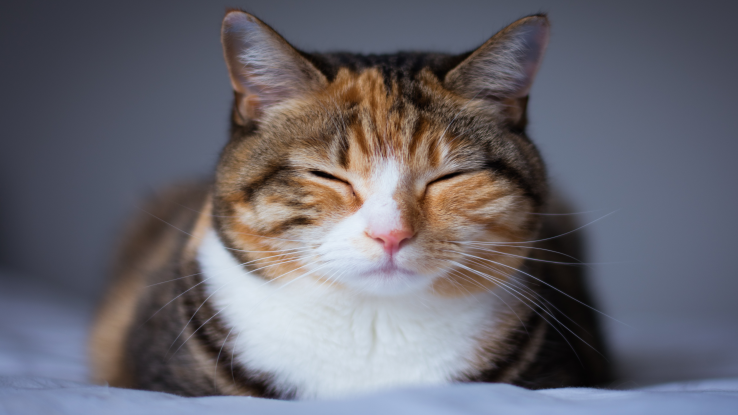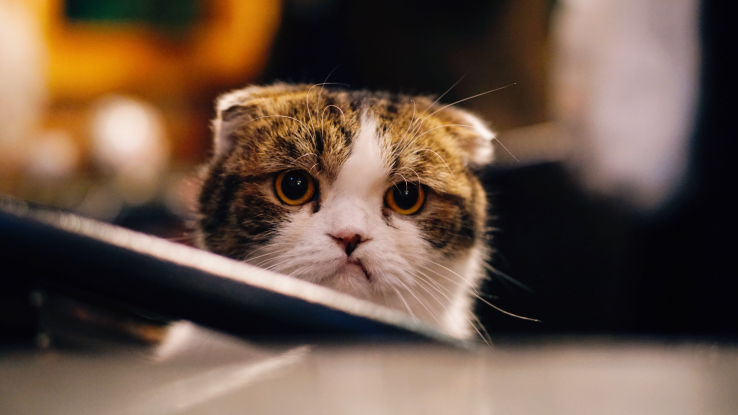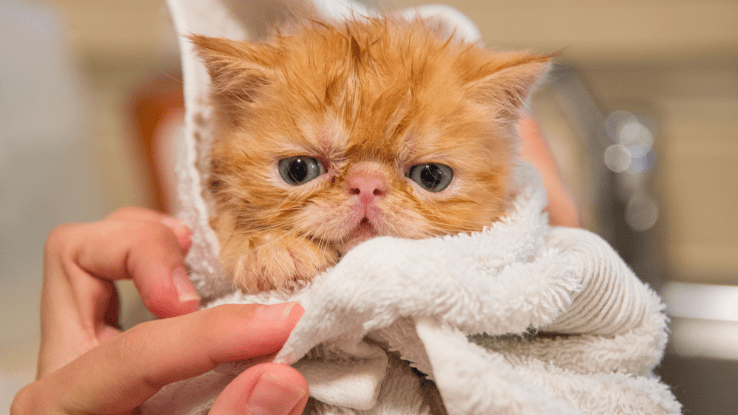How to Feed Two Cats When One is Overweight
Cats are some of the most distinctive pets on the planet. They act so radically different from other common pets that it often leads many to wonder just what exactly is going on in that walnut-sized brain. This query becomes even more prominent when it's time to give ol' Boots a bath.
It's not exactly a state secret that cats don't respond well to water. In fact, you can almost bet that most cats will royally freak out when exposed to it. So, what gives? We explore this age-old conundrum to shed light on why cats appear to hate water.
Cats and Water: Why the Hate?

As it turns out, there are actually a few reasons why cats aren't fans of water. They'll drink it, sure. But once that water comes into contact with their fur, all bets are off. Why is this the case?
Let's explore.
1. No Control
If you're a cat owner, you've probably noticed that your feline likes things their way or no way at all. Cats are very temperamental, and they like to be in control. But once they become submerged in H2O, cats no longer have the same amount of control as they normally do.
This makes for a very stressful experience — not to mention all the commotion that comes with getting a bath. As a result, it's easy to see why cats prefer bathing themselves.
2. Added Weight
Unless you've been spoiling your cat, and they now resemble Garfield, felines are normally pretty nimble little creatures. But when their fur gets saturated, it's akin to you carrying around a wet blanket. The added weight is not in the least appealing to cats, as it negatively affects their normal agility.
Factor in a general sense of discomfort, and you've got one unhappy feline on your hands. But these aren't the only reasons cats dislike baths. Keep reading to see what else it is about water that most cats hate.
3. Water Stinks
Maybe humans can't readily detect the scent of water, but cats sure can. In normal tap water, there is a staggering total of more than 60,000 chemicals. On top of those, there are also more than 90 pollutants found in your everyday tap water.
The sense of smell is a feline's most used attribute. As such, your cat will notice the odors that come from all of these chemicals right away. Just being submerged in something that doesn't smell anything like your cat's coat is bad enough.
But when bath time is involved, you also have to consider the various scents of soaps and shampoos. With all of these odors attacking your cat's olfactory senses, it's little wonder why felines are so opposed to water and baths.
4. Negative History
If your cat had a bad experience with water when it was a kitten, it's safe to say that they will remember it well into adulthood. Maybe your cat nearly drowned when they were a kitten or got scared from being submerged in water.
Whatever the case may be, it's easy to understand why your cat might be afraid to be anywhere near water, let alone baths.
5. It's Unnatural
To cats, getting a bath goes against everything in their nature. Even if you aren't a cat owner, you've likely noticed cats bathing themselves. This is usually the best way for your cat to stay clean. What's more, adult cats even bathe their own kittens.
So in their eyes, there is simply no need for water and bathtubs. And it's a big part of why cats throw a fit when they're forced to get soaking wet.
Do All Cats Hate Water?

While it's easy to assume that all cats hate water, this actually isn't the case. There are a few felines that appreciate a good bath, and for a good reason.
Explore below to learn which cats don't mind water and why.
Abyssinian
It's interesting to point out that the Abyssinian breed traveled to many countries by way of boat. It stands to reason, then, that these cats quickly got accustomed to water from being out on the open seas.
And perhaps this is a quality that's been handed down from generation to generation. It's not uncommon to see Abyssinians willfully investigating all manner of water, from streams to sinks to bathtubs.
So if you want a cat that won't give you any paw come bath time, you may very well want to consider adopting an Abyssinian.
Maine Coon
What sets the Maine Coon apart from many other breeds of felines is its fur. As it turns out, the Maine Coon's coat is water-resistant, making this type of cat far friendlier around water.
In fact, if you leave water running anywhere in or around your house, you can count on a Maine Coon's curiosity to lead it to investigate.
Moreover, the Maine Coon's coat allows it to do far more than anything a traditional cat can offer. And it's why this breed was chosen to act as pest control aboard ships in olden times. This further explains why Maine Coons are so easy-going around water.
Combine the cat's water-resistant fur, and you've got the perfect recipe for a water-loving feline.
Turkish Van
Also known as "swimming cats," Turkish Vans have an incredible attribute that stands out above all others: waterproof coats. As such, this breed's fur doesn't retain water after being submerged. Thus, it allows them to enjoy water with no ill effects.
What's more, Turkish Vans enjoy water so much that their owners will often buy them little "kitty" pools to swim around in.
If you thought all cats hated water, these three prove that there are exceptions to the rule. Maybe you love cats but can't imagine wrestling with one come bath time. If that's the case, either of the breeds listed above should serve you well.
Bathing Your Cat

As discussed, most cats will take care of their own bathing needs. Cats are known for their habit of self-bathing (via their paws, tongue, and teeth). As such, you can usually trust that your cat will keep itself clean.
And since cats generally dislike having anything foreign on their fur, there's a good chance that they will stay on top of any hygienic needs. With that said, there are times when your furry feline friend needs a helping hand.
Maybe your cat is covered in tree sap or picked up fleas. Whatever the reason, it's important to know how to approach bathing before you jump right into it. You could end up with bites and scratches if you're not careful.
Before you give your cat a bath, you want to first trim their nails. This way, your cat will inflict minimal damage if it gets spooked and starts hissing and swiping at you.
It's also a good idea to brush out their fur before you proceed with their bath. Why? Because most cats are known to be heavy shedders. You run the risk of all that hair clogging up your drain if you don't first brush it out.
- Here's another helpful tip: Since cats generally hate water, you can help keep it out of your pet's ears during bath time by placing some small cotton balls in them.
Before running the bathwater, lay a towel at the bottom of the tub. This will give your cat something to hold onto so they're not slipping and getting scared.
As you're bathing your cat, try to resist using hot water. It might feel good to you, but to a cat, it's quite uncomfortable. A water temperature just above lukewarm should do the trick. When you're ready to apply water to your feline, use a cup or gentle sprayer rather than submerging them.
Never use shampoo meant for people, as it can irritate your cat's skin. Instead, always use a shampoo that is specially formulated for felines. After you apply the shampoo, make certain that you rinse off all traces of it.
Finally, make sure your furry friend is completely dried off, as a damp cat is an unhappy cat. When finished, give your feline a treat, as this will show them that bath time comes with rewards. Hopefully, your cat will be more apt to take a bath when necessary.
Water Wary
Most cats might hate water, but with the right care and precautions, you can help make bath time less stressful. And when your feline feels at ease, it should be far easier to get them around water.
Sources:
What's in Your Drinking Water? | NRDC
Turkish Van Cat Breed Information | Vet Street
Why Do Cats Groom and Lick Themselves So Often? | The Spruce Pets
Source: https://www.reference.com/pets-animals/do-all-cats-hate-water?utm_content=params%3Ao%3D740005%26ad%3DdirN%26qo%3DserpIndex&ueid=214e8370-3f95-4d34-81df-e31bde4909e5
Postar um comentário for "How to Feed Two Cats When One is Overweight"